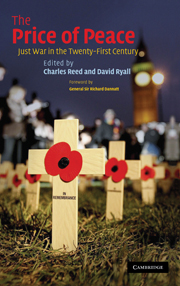Book contents
- Frontmatter
- Contents
- Notes on contributors
- Foreword by Richard Dannatt
- Acknowledgements
- 1 Introduction
- PART I A framework for ethical decision making: state and civil society-based approaches
- PART II Responding justly to new threats
- PART III Fighting wars justly
- PART IV Securing peace justly
- 12 Justice after war and the international common good
- 13 Conditions for jus in pace in the face of the future
- 14 From just war to just peace
- PART V Concluding reflections
- Bibliography
- Index
12 - Justice after war and the international common good
Published online by Cambridge University Press: 03 December 2009
- Frontmatter
- Contents
- Notes on contributors
- Foreword by Richard Dannatt
- Acknowledgements
- 1 Introduction
- PART I A framework for ethical decision making: state and civil society-based approaches
- PART II Responding justly to new threats
- PART III Fighting wars justly
- PART IV Securing peace justly
- 12 Justice after war and the international common good
- 13 Conditions for jus in pace in the face of the future
- 14 From just war to just peace
- PART V Concluding reflections
- Bibliography
- Index
Summary
While it is true according to Dr Johnson that nothing concentrates the mind so much as the prospect of being hanged, the prospect of being shot by a sniper or hit by a mortar or blown apart by a bomb will probably do just as well in bringing certain issues to the fore with an urgency and vigour which they do not customarily have. For this reason, the parts of just war theory which fall under the headings of jus ad bellum (the right to enter into hostilities) and jus in bello (the right to be observed in the conduct of hostilities) have drawn more concentrated and more sustained attention than the moral issues which cluster around the end of hostilities and the return of peace, a cluster which there is now an increasing tendency to speak of as jus post bellum (the right to be established after hostilities). At this point, politicians, diplomats and lawyers return to the centre of the stage; a complex process of negotiations brings us closer to the resumption of politics as usual. The territory is less well charted, and its features are less arresting and less ominous than the precipitous and craggy landscape of war.
This chapter is not primarily concerned with the events which terminate hostilities, but with the altered network of relationships between combatants and among nations which arises at the end of hostilities and with different ways of conceiving this network.
- Type
- Chapter
- Information
- The Price of PeaceJust War in the Twenty-First Century, pp. 219 - 235Publisher: Cambridge University PressPrint publication year: 2007



